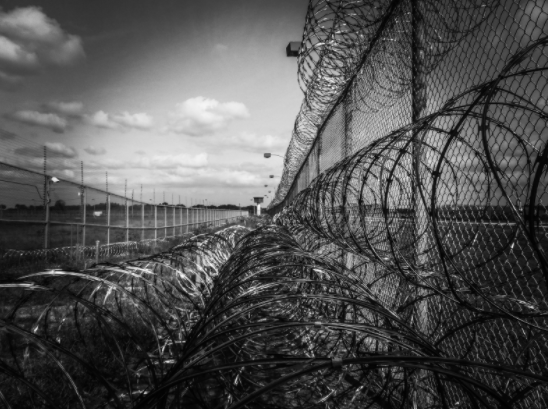
Image adapted from Wikicommons by DhLeaks44 / CC BY-SA 4.0
“If God is a God of Redemption, Should Government Get in the Way?”
Teri Thompson
If the greatest sinner on earth should repent at the moment of death, and draw his last breath in an act of love, neither the many graces he has abused, nor the many sins he has committed would stand in his way.
–Saint Therese of Lisieux (1873-1897)
For the inmate who chooses redemption, connecting to a divine Creator is an important step. When facing the death penalty, the choice to seek spiritual solace can become even more important when the inmate is placed on death watch and scheduled to die.
During death watch, the period of time after a death warrant is issued following exhaustion of the inmate’s appeals, the inmate is moved from death row to a cell next to the death chamber to be strapped to a gurney and executed. It is during these final moments that the condemned, if desired, can meet with a religious leader to face the reality of life’s end.
Freedom of religious exercise is one of our country’s most sacred constitutional protections. The First Amendment to our Constitution unequivocally guarantees our right to religious freedom: “Congress shall make no law respecting an establishment of religion, or prohibiting the free exercise thereof.”1U.S. Const. amend. I
Twenty-five years ago, Congress enacted the Religious Freedom Restoration Act (RFRA), seeking to protect the free exercise of religion from government interference. In 1997, the Supreme Court invalidated portions of RFRA as they applied to the states. RFRA remains constitutional on the federal level. Three years later, Congress unanimously passed the Religious Land Use and Institutionalized Persons Act (RLUIPA), which specifically prohibited state and federal governments from placing a substantial burden on a prisoner’s right to worship as he pleases.
The Supreme Court upheld RLUIPA’s provision on institutionalized persons and emphasized that the clear command of the First Amendment is that “one’s religious preference cannot be officially preferred over another.”2Cutter v. Wilkinson, 544 US 709 (2005) The Court also noted that RLUIPA protects institutionalized persons who, unable to freely worship, depend upon the government’s permission and accommodation to exercise their religion.3Id.
Freedom of religious exercise is one of our country’s most sacred constitutional protections.
As a practical matter, both federal and state prisons allow inmates to participate in religious programs and worship services. Most prisons have chaplains on staff who facilitate faith-based programs, and some prisons allow community volunteers and church groups to lead religious services. Whether inmates pursue religious services to resolve remorse or guilt, to achieve atonement, or even to find respite from the rigors of daily prison life, the Constitution protects their choice to seek spiritual guidance.
Consistent with federal law, prisons also allow inmates to pursue religious convictions of their choosing. Many prisons distribute both the Bible and the Qur’an, and religious services in Judaism, Christianity, Buddhism, Hinduism, and Islam are offered in a number of facilities. In fact, in 2019, inmates in Michigan successfully filed suit to exercise their right to communally worship pagan holidays.
Spiritual solace for those condemned to die has historical origins going back to fifteenth century England. Historians note that “even the most reprobate of offenders could save themselves from eternal torment if they made a full, free and ingenuous confession in their final moments.”4Andrea McKenzie, Tyburn’s Martyrs: Execution in England 1675-1775, (2007) Ministering to the condemned was believed to be a necessary duty of the priests.
Despite historical evidence of providing spiritual guidance to the condemned in their final moments, as well as current legal precedent supporting inmates’ right to worship, recent executions have raised doubts as to whether inmates on death watch can actually exercise their chosen faiths as federal law mandates.
On February 7, 2019, Dominique Ray, a practicing Muslim, was executed in Alabama’s Holman Correctional Facility without an opportunity to have his spiritual advisor present during his execution as he had requested. Since Ray’s conviction in 1999, Ray’s imam had spent the last six years of Ray’s life meeting with him on death row. When Ray petitioned the warden to have his Muslim cleric present and pray with him during his execution as Alabama state law provides, the request was denied. The warden would only offer an on-staff Christian minister.

Following petitions to the Supreme Court to determine whether the prison’s policy violated the First Amendment, a sharply divided Court denied review of the case which resulted in the lower court’s ruling becoming the final decision. In a strongly worded dissent, Justice Elena Kagan, joined by the late Justice Ruth Bader Ginsberg, found the State of Alabama’s reliance on security needs to be an insufficient and unconstitutional justification to support a denominational preference. Ray was executed without the presence of his spiritual leader in the death chamber.
On November 7, 2019, the Supreme Court halted the execution of Patrick Murphy within days of the scheduled time because the Texas State Penitentiary did not allow his Buddhist chaplain into the death chamber with him. At issue in Murphy’s case was the prison’s policy of only providing state-employed Christian or Muslim chaplains. The Supreme Court, however, reasoned that such practices violate Murphy’s religious freedom rights, because while Christian inmates were allowed to have a religious advisor of their faith during an execution, inmates of other faiths were not. As of the time of this article’s publication, Murphy’s execution is still pending.
On June 16, 2020, less than an hour before Ruben Gutierrez’s scheduled execution at the Texas State Penitentiary, the Supreme Court again granted a last-minute stay to consider the legality of the prison’s new policy of banning all spiritual advisors during death watch. Gutierrez requested his Catholic priest to be present in the death chamber in his final moments. The Texas Catholic Conference of Bishops filed appeals with the United State Supreme Court, contending that such a ban denies the condemned access to spiritual guidance in the face of death. Again, as of now, Gutierrez’s execution is still pending.
On July 16, and July 17, 2020, Wesley Purkey and Dustin Lee Honken were executed at the United States Penitentiary in Terre Haute, Indiana amidst lawsuits filed by their spiritual advisors. Purkey met monthly with his spiritual leader, a Zen Buddhist priest, for 11 years prior to the execution date and requested his presence during his execution. Likewise, Honken sought to have his Catholic priest present during his execution.
recent executions have raised doubts as to whether inmates on death watch can actually exercise their chosen faiths as federal law mandates.
As COVID-19 continued to spread nationwide, with outbreaks rampant at the Terre Haute facility, the priests urged the high court to delay the executions until the prisoners’ spiritual advisors could safely travel and be present as their religious roles dictated. These spiritual leaders argued that the First Amendment prevents the government from burdening an individual’s right to exercise religious rights, and that to proceed with the scheduled executions would force the priests to choose between abandoning their religious duties or risking exposure to a rapidly-spreading disease. The Supreme Court denied their requests, and the executions proceeded as scheduled.
Execution is the harshest sentence in our criminal justice system. While some uphold capital punishment as an example of our criminal justice system performing its duties to the nation, others denounce it as retribution that does nothing to advance societal interests. Despite these opposing views, federal law assures the right for the condemned, who exists on the threshold of death, to seek spiritual solace in their last remaining hours of life. If in those final moments the inmate chooses spiritual guidance, not only does redemption have a place during execution procedures, but reminds us of the restorative possibilities of spirituality. ♦

Teri Thompson has represented 31 men and women facing the death penalty in state and federal court. She is currently Learned Counsel in federal capital cases in Georgia, Alabama, New York and the Virgin Islands.
Recommended Citation
Thompson, Teri. “If God is a God of Redemption, Should Government Get in the Way?” Canopy Forum, November 25, 2020. https://canopyforum.org/2020/11/25/if-god-is-a-god-of-redemption-should-government-get-in-the-way/

